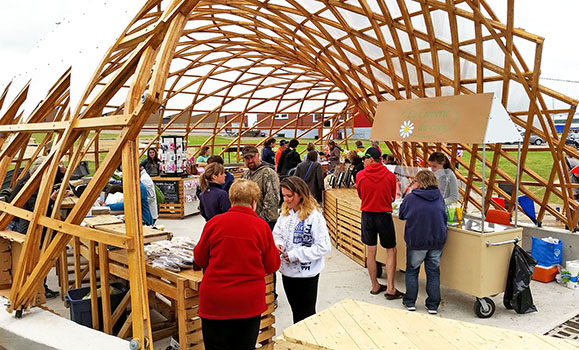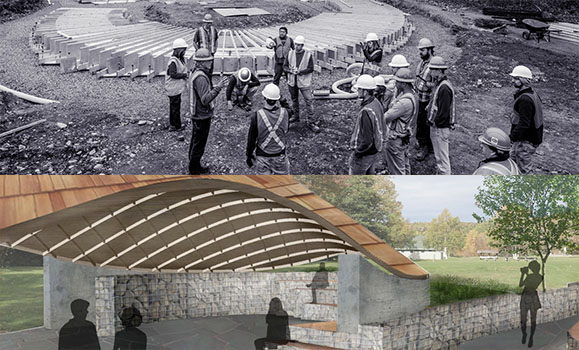If you’ve recently taken a trip to the Acadian town of Cheticamp, on the west coast of Cape Breton, you may have noticed a modernistic new addition.
In the summer of 2014, ¬È∂π¥´√Ω Architecture students created an innovative, wooden banana-shaped structure to house the weekly farmer‚Äôs market. This design, known as a gridshell, not only protects vendors and market-goers from the strong southeasterly winds, it also draws in local tourists with its fresh, contemporary look.

The gridshell was created by Dal Architecture students — part of a unique design-build course called . Created by Architecture Professor Ted Cavanagh, it’s open to students like Sarah Dede and Josh Nieves taking their Master of Architecture (MArch) degrees. The program allows them to work with their hands and see the fine lines of drawings come to life.
A unique learning environment
“We had been working in the field for a few years but what we really wanted to do was work with our hands,” explains Josh. “In offices, you don’t quite get it. You can understand how things go together but it’s completely different when you assemble something yourself.
“Architects are always concerned with the final product, but this is teaching us a little bit more about the process to achieving that final product.”
‚Äú¬È∂π¥´√Ω has such a long history of amazing design build programs,‚Äù explains Sarah, who, like Josh, came to ¬È∂π¥´√Ω from San Antonio, Texas. ‚ÄúThis program is what sparked our interest in ¬È∂π¥´√Ω. It sounded really neat and like something we would definitely be interested in. Once we found out we were accepted we were so excited to make the move to Canada.‚Äù
Currently, Sarah, Josh and other ¬È∂π¥´√Ω students are working on a gridshell design for the Cape Breton Highlands National Park (below). This will be the fifth and final gridshell from the collaborative series between ¬È∂π¥´√Ω, the University of Arizona, University of North Carolina Charlotte, and the University of Louisiana Lafayette.

“This is a multi-purpose pavilion that will hopefully be used for concerts, weddings, and anything the community wants,” says Sarah. “We are working really hard to use local materials, too. For instance, the wood we are using for the roof is locally sourced, as is the stone and slate for the flooring.”
“They’re trying to pull a younger crowd and audience to the park,” adds Josh. They’re trying to ramp up the infrastructure of the park so more people will want to come check it out.”
Bridging the gap
Design-build courses like Costal Studio help set Dal’s Architecture program apart, and giving students the opportunity to work with their hands while using concepts they have previously learned in class is an incredibly valuable opportunity.
“I think Costal Studio really allows students to bridge that gap between class or office work and real life experience in the field,” states Sarah. “The ideas we learn in class become an “Aha!” moment when you’re out in the field with your tools. It’s cool to think to yourself, ‘I remember learning this in class,’ and then using that knowledge in a real life situation.”
Learn more about Coastal Studio and its work .

